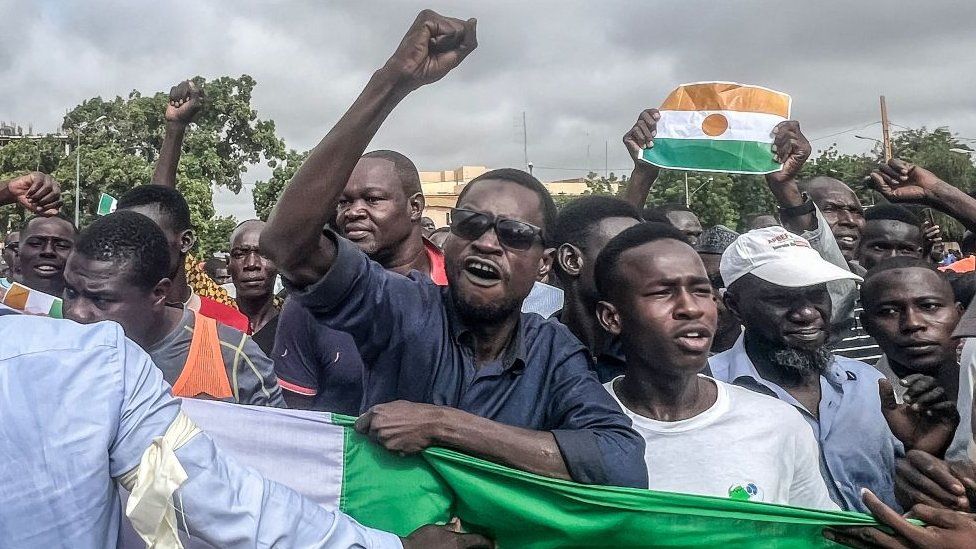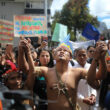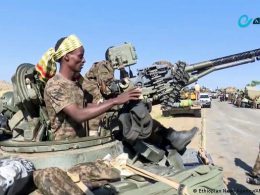Ory, Militant CI — our sister organisation in Côte d’Ivoire
What seemed like a rumor finally became a certainty. The Nigerien president Mohamed Bazoum was ousted from power by the military. How did we get here and what lessons have been learned from this umpteenth putsch in a region of the Sahel confronted with jihadists and poverty?
If officially, everything seemed to have started from President Bazoum’s desire to dismiss the head of his Presidential guard, the new strong men of the country justify their act by a deterioration of the security situation — accompanied by heavy defeats of the Nigerien army against the jihadists since the coming to power of Bazoum. Thus the army judges the omnipresence of UN and French forces in the country as useless.
Experience shows, however, that jihadism in the region cannot be defeated on a purely military basis, because it also has a social root — among other things, the agrarian question, which finds no solution in a situation where climate change and desertification increase pressure on land and resources.
And the people in all this?
We remember the many demonstrations that took place in the country after the first announcement of the arrival of the French soldiers driven out of Mali. The very day when columns of the former Barkane and Takuba* rallied in Niger, protests broke out. But the Nigerien authorities had minimized this anger, even going so far as to qualify this military presence as salutary and beneficial for the country, while repressing and prohibiting mobilizations against the latter.
* The French “Operation Barkhane” and “European “Takuba task force” conducted ‘counterinsurgency’ operations with Nigerien forces in the Sahel.
Ideas taken up by the masses have a material force. The fact that the French army had been driven out of Mali and Burkina had in no way bothered the president, who wanted to take advantage of this opportunity to strengthen his cooperation with the French authorities and thus build a solid friendship with Western and in particular French imperialism in the increasingly hostile Sahelian region. Bazoum’s idea of making Niger a stable base of operations for the former colonial power in the midst of a region in crisis has in turn been shattered. This also poses the failure of bourgeois democracy, in a country that had been branded as a recent “democratic success story” on the continent, arguably overcoming a long legacy of military coups.
The failure of bourgeois democracy
Indeed, the manifest support from part of the population for the military and their hostility to legal institutions reveal the bankruptcy of bourgeois democracy. This is valid not only in Niger, but generally spread throughout the region. Less than a decade ago the region was swept by movements against third mandates and for democracy such as “Y’en a Marre” in Senegal and “Le Balai Citoyen” in Burkina. However, the bourgeois politicians who hijacked those movements forgot about their social promises and reduced everything to an election with universal suffrage by secret ballot. After which, the ruling classes under the cover of legality keep economic and state power, and in alliance with imperialism, do anything they want while the populations must wait for new elections to be able to sanction them.
However, the peoples of the Sahel are now showing their eagerness to be associated with the political, economic and social choices taken on their behalf; to be seen a little more clearly in the management of public affairs after the elections. Dissatisfaction with the situation of poverty, inequality and violence is growing, but the absence of an independent organization to bring this struggle on a class basis provisionally offers the opportunity for the military to fill the void.
We have clearly seen with what has just happened in Niger that the popular masses no longer give any credit to calls for a return to institutional order or constitutional legality. People have also become deaf to the appeals of the international capitalist institutions (ECOWAS, AU, EU, UN). ECOWAS is playing its political credibility after so many coups in the region. It has condemned the coup and is now threatening to intervene militarily, dancing on the same foot as the French government, which said it was ready to react if “French interests” were jeopardized. While opposing the new military leaders in Niamey, ISA firmly opposes any military intervention in Niger, which threatens further destabilization, violence and misery for the people of the region; we call upon working people in Cote d’Ivoire, Nigeria and across the region to take decisive action if that imperialist-backed threat was to materialize.
The lack of alternatives
Nevertheless, we see that people are caught between a rock and a hard place. They are opposed to the “legal” civil authorities, but the absence of political parties of struggle capable of solidly carrying out their legitimate demands, pushes them to support putschists who owe their importance only to the absence of a credible alternative.
Yet the short experience of the coups in Mali and Burkina Faso already demonstrate that the new military regimes have no programme nor even a genuine intention to address the deep-seated problems engendered by the private appropriation and looting of these countries’ resources by big corporations, the root cause of mass poverty and all the social ills inflicted upon these societies. In Mali, the military regime has attacked striking workers. The top layers of those regimes, such as the new Nigerien junta leader Abdourahamane Tiani, have themselves profited from this system for years.
The current conditions, marked by both huge dissatisfaction with the deteriorating status quo and the absence of a mass political organisation that could regroup the mass of workers, poor and youth around a struggle to fulfill their own needs and interests, lead many to believe that Russia — which is trying to exploit the blows to French and US imperialism in West Africa and the outburst of anger against the ex-colonial master for its own sake— could be a more reliable and disinterested partner to cling onto.
However, there should be no illusions that Russia, nor China for that matter, represent a genuine, “worker and people-friendly” alternative. The thirst of the masses to transform their lives and get rid of the imperialist hold over their country will find no positive outcome by replacing an imperialist power and dependence by others who are guided by their own agenda, seeking to extend their own geo-political influence across the continent in a new “scramble for Africa”. All imperialisms support dictatorships and seize natural resources. The people of Niger should be able to determine their own future away from any foreign interference. Along with their class siblings across the region, they should lead a struggle on their own terms to take sovereign control over the way their countries’ vast wealth is being utilized.
In this period of turbulence in the Sahel, ISA encourages the building of embryos of struggle in this region with a clear analysis of the limits of capitalism, the role of imperialism, the failure of bourgeois institutions, the failure of the investments in war made by the military regimes of Mali and Burkina in relation to their impact on investments in basic social services — health, education, drinking water, electricity etc.
ISA advocates the nationalization of the key sectors (such as the uranium mines) under democratic control of the workers and population in order to use their potential to meet social needs: massive investments in developing infrastructure and public services, creation of decent jobs for young people, substantial aid to small farmers for climate adaptation, etc. The people of Niger and the region need to wage this struggle within the trade unions and on the streets, and build revolutionary organizations capable of formulating such demands for the populations of the region, and ready to fight until the end to bring them to fruition.












